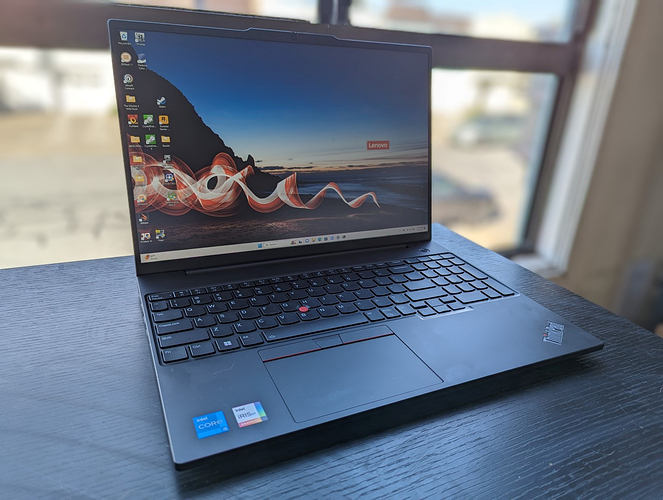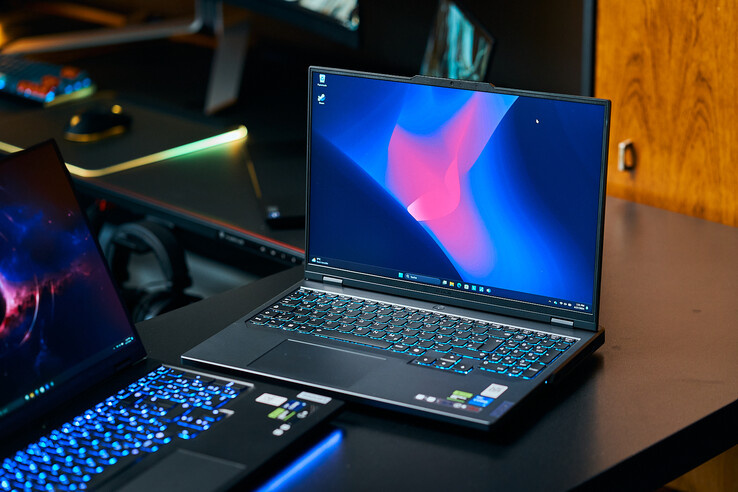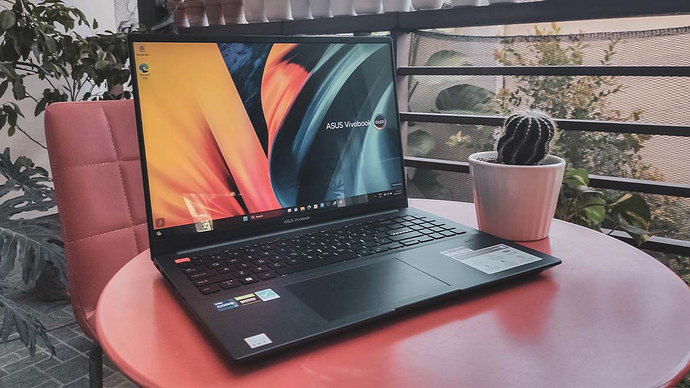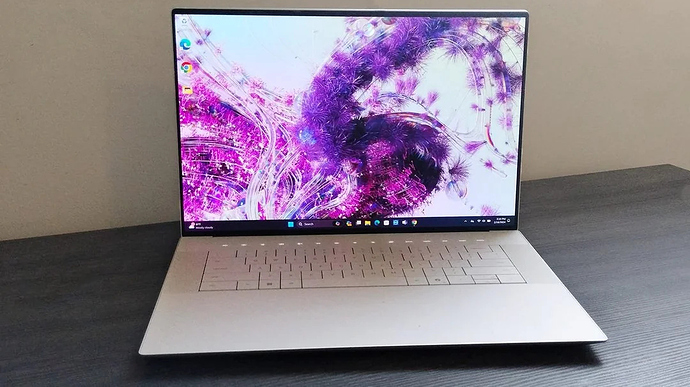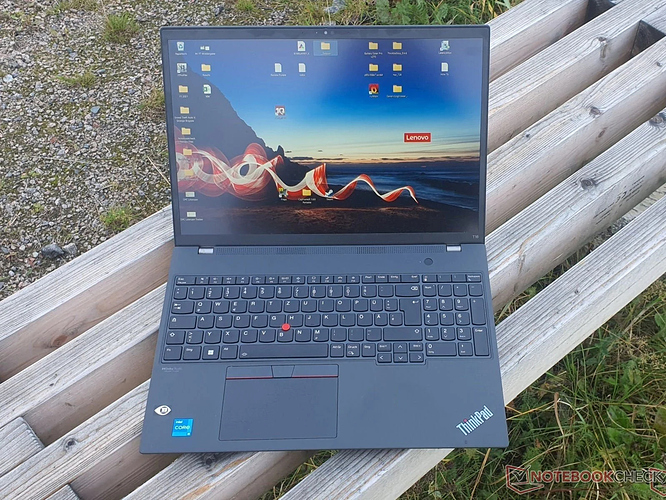Cyber security work isn’t light. You need a laptop that can run virtual machines, test environments, penetration testing tools, packet sniffers, and security-focused OS setups without slowing down. Whether you’re a student learning the ropes or a working pro managing networks or monitoring logs, your machine has to be secure, stable, and powerful enough to keep up.
This list includes laptops that handle real-world cyber security needs — from dual-booting Kali Linux to running tools like Wireshark, Burp Suite, Metasploit, or Splunk. If you work with multiple VMs, analyze malware, or handle sensitive data, these picks are made to back you up without cutting corners.
1. Lenovo ThinkPad E16 – Best For Entry-Level Cyber Security Work
The ThinkPad E16 is one of the best starting points for anyone entering cyber security. It delivers strong performance without the premium price, making it ideal for students or junior analysts who need a machine that can handle learning environments, scripting, and basic virtualization. With AMD Ryzen 7000 series or Intel Core i5 and i7 options, it holds up under multitasking and doesn’t overheat when you are running heavier apps.
The keyboard follows Lenovo’s business standard — solid key travel and comfort for long hours of work. The 16-inch display is large enough to work across terminals, browsers, and documentation without feeling cramped. You can spec it with up to 40GB of RAM and a fast SSD, which is more than enough for running a couple VMs, handling log analysis, or experimenting with Kali Linux in dual-boot or virtual mode.
Battery life lands around 9 to 10 hours with typical use, and the chassis feels solid enough for daily transport. It’s a great balance of power and affordability, especially for users who are starting to build their skill set or setting up their first home lab.
2. Lenovo Legion 5i – Best For Running Virtual Machines
The Lenovo Legion 5i is a sleeper pick for cyber security professionals who need serious power under the hood. Though technically built for gaming, its specs make it perfect for heavy multitasking and running multiple virtual machines. It comes with Intel Core i7 or i9 chips and up to NVIDIA RTX 4070 graphics, which helps when pushing several VMs or emulating test environments.
The 16-inch display offers high refresh rates and sharp clarity, making it useful if you are working across terminals, dashboards, or visual interfaces like Splunk. It supports up to 32GB of RAM and has multiple M.2 SSD slots, so storage and speed are not going to be an issue when working with large log files, packet captures, or custom sandbox setups.
Battery life averages 6 to 8 hours depending on workload, but this is a laptop that thrives when plugged in and working hard. If your workflow includes spinning up labs, testing exploits, or analyzing software in isolated environments, the Legion 5i gives you enough power and flexibility to do it smoothly.
3. ASUS VivoBook Pro 16 – Best For Balancing Work and Creative Tools
The ASUS VivoBook Pro 16 is a solid pick if your cyber security work overlaps with scripting, documentation, or occasional content creation. It runs on AMD Ryzen 9 or Intel Core H-series processors and comes with dedicated NVIDIA graphics, which gives you enough muscle to run virtual machines, network monitoring tools, and secure containers without slowdown.
The 16-inch OLED display is one of the highlights. It is sharp, color-accurate, and comfortable to look at for long hours of reading logs, writing code, or analyzing threat data. The full-size keyboard is spacious and includes a number pad, which can be handy for input-heavy tasks or using shortcuts in terminal-heavy workflows.
You can spec it with up to 32GB of RAM and a large SSD, and it handles multitasking well even when multiple tools or browser tabs are active. Battery life averages around 10 hours in standard use and holds up well for remote work or study sessions. If you want a powerful, clean machine that can run your tools and look good doing it, this laptop fits.
4. Dell XPS 16 – Best For High-End Security Work and Data Analysis
The Dell XPS 16 is a performance laptop made for professionals who need speed, clarity, and power in one tight build. It is powered by Intel’s Core Ultra processors and includes up to NVIDIA RTX 4060 graphics, which makes it more than capable of handling full-stack analysis, virtual lab environments, and real-time monitoring without lag.
The 16.3-inch OLED display is bright, color-accurate, and easy on the eyes — great for reading logs, toggling dashboards, or watching real-time threat feeds. The build quality is premium, and the laptop feels solid during long sessions. The keyboard is comfortable, and the large touchpad gives precise control without needing a mouse.
It supports up to 64GB of RAM and multiple SSD configurations, which helps when working with large datasets or analyzing captured traffic. Battery life is strong considering the hardware, pushing past 10 hours on moderate use. If your role involves advanced cyber security tasks, data analysis, or remote infrastructure management, this laptop gives you the firepower to do it cleanly.
5. Lenovo ThinkPad T16 Gen 2 – Best For Enterprise Security Setups
The ThinkPad T16 Gen 2 is built for business professionals who need rock-solid stability, advanced security features, and performance to match. With AMD Ryzen Pro or Intel vPro processor options, this laptop supports hardware-level encryption, secure boot, and biometric logins that are ideal for enterprise-level security environments.
It offers up to 64GB of DDR5 RAM and fast PCIe Gen 4 SSDs, which makes it easy to run several tools and platforms at once without bottlenecking. The 16-inch display gives you plenty of screen real estate for managing logs, alerts, SIEM dashboards, or network maps. And because it is part of the ThinkPad line, the keyboard is built for serious work, with solid travel and a comfortable layout.
Battery life is dependable, running 11 to 12 hours with regular business tasks. It is not flashy, but it is reliable, durable, and secure — exactly what you want if your work involves protecting sensitive networks or managing IT security in high-risk environments.
Final Thoughts
Cyber security requires more than just performance. You need reliability, flexibility, and tools that won’t fall short when the workload gets heavy. Whether you are managing VMs, writing exploits, or running packet captures in real time, the laptops on this list are built to support real cyber security workflows.
Pick what fits your level, whether you are just getting started or working in the enterprise space.
Because when it comes to security, your machine should be just as sharp as you are.

